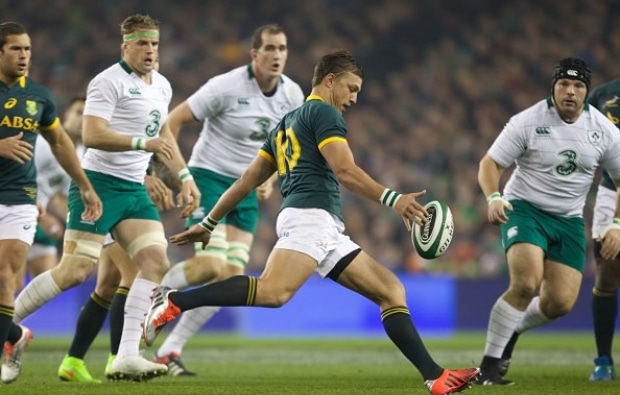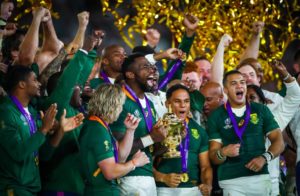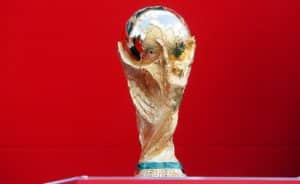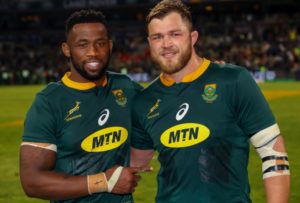The Springboks must use the four-Test tour of Europe to settle on a game plan and develop a squad with the 2019 World Cup in mind, writes JON CARDINELLI.
A week is a long time in rugby.
On 7 October, South Africa went back to the approach that worked for Heyneke Meyer’s Boks, Peter de Villiers’ Boks, Jake White’s Boks, and indeed every moderately successful Bok side in the professional era.
A shift towards a more direct and pragmatic approach didn’t result in victory for the Boks, but it did rattle the All Blacks and challenge the widely-held perception that they are unbeatable.
The news that followed the Boks’ one-point loss at Newlands was just as encouraging. Rassie Erasmus is set to take up his post as director of rugby earlier than expected, perhaps as early as next month. This is the same Erasmus who transformed the Stormers into a physically and tactically imposing unit between 2008 and 2012. This is the coach who masterminded a turnaround at Munster in the space of a few months.
What’s more, Erasmus is bringing defence guru Jacques Nienaber back with him to South Africa.
Remember the ‘Wall of Newlands’, the tournament-leading defence that frustrated even the best New Zealand sides in the Super Rugby tournament during that aforementioned period? Speak to the players who featured for the Stormers at that time and they will tell you that Nienaber built it.
That said, things are hardly hunky dory at SA Rugby headquarters. For starters, Johann van Graan will join Munster as head coach in November. Who will be responsible for coaching the Bok lineouts in his absence?
There’s been no clarity on the subject of Brendan Venter. The crack defence coach has worked closely with the Boks in 2017, but is expected to work closely with the Italy side – he’s contracted to the Azzurri until the end of 2019 – in the lead-up to the next World Cup.
The Boks will face Italy this November and again at the global tournament in 2019. This year, many a journalist has asked the question: How can a coach be involved with two teams that will directly oppose each other at the next World Cup? Going by what’s been said on social media, many fans have asked the same question.
What has head coach Allister Coetzee brought to the mix in recent times? The rumour doing the rounds in the lead-up to the recent Test in Cape Town was that Coetzee was a dead man walking. Following the loss at Newlands, Coetzee’s win-record with the Boks stood at nine wins in 21 Tests (43%) over a period of 16 months.
Perhaps that record will shape Coetzee’s attitude towards the coming tour. Perhaps he will adopt a win-at-all-costs mentality. Perhaps he will select players with the aim of finishing the sojourn to Europe with two or three wins and with the ultimate goal of retaining his job.
That approach, however, could have dire consequences for the Boks on a longer timeline.
The Boks have to persist with a pragmatic game plan. That shouldn’t be a point of debate.
Whether they have the players to do so right now is less certain.
The match at Newlands showed what can be accomplished when a Bok forward unit fires at the set pieces and collisions. At the same time, it highlighted South Africa’s weaknesses at scrumhalf and flyhalf, and across the backline.
As good as the forwards were against the All Blacks, the backs failed to translate front-foot ball into sufficient territory and points. The back division’s gainline and decision-making performance let the Boks down.
I’ve heard it said this past week that Ross Cronjé and Elton Jantjies are the best halfbacks that South African rugby has to offer. That for me sums up the Boks’ problems at present.
The dearth of quality in these positions needs to be addressed across the four Tests in Europe with the 2018 season and the 2019 World Cup in mind.
Coetzee has already burned through two scrumhalf options in Faf de Klerk and Francois Hougaard. De Klerk wasn’t considered for selection this season after a poor finish to 2016, not even for the SA A side. Hougaard was dropped from the Bok squad after a shoddy showing in Albany. Coetzee’s subsequent attack on the player’s technical skills gives one reason to believe that a recall is highly unlikely.
There was a time when the Boks were spoiled for choice at No 9. Fourie du Preez was a tactical genius who could alternate between a running and a kicking game. Ruan Pienaar didn’t have the same mental strength as Du Preez or the same ability to control a contest – like Aaron Smith, Conor Murray and Ben Youngs do today – but he had the attributes to play a style suited to the Boks’ traditional approach.
Who else is there? Rudy Paige and Louis Schreuder are likely to tour with the Boks. Both have been around for a while. Paige is yet to live up to the hype. Schreuder had a solid season with the Kings in Super Rugby, but still has much to prove as a tactical player.
South Africa can’t afford to travel to the next World Cup with only one settled halfback combination. A squad of 31 should contain three options in each of those positions. Every team that travels to the global tournament should include players with the experience as well as the technical ability to contribute, that is if they want to compete for the title.
Handré Pollard is a special player with the potential to rival the great Test flyhalves. Unfortunately, he’s struggled with injuries over the past two seasons.
What Pollard does have is experience. He started at No 10 when the Boks beat the All Blacks in 2014. He was backed in that position for the biggest games of the 2015 World Cup. Despite his tender age, he never shirked the responsibility.
Jantjies has never been to a World Cup. At the age of 27, he is yet to convince as a big-match player. Most recently, he has failed to assert himself in the Super Rugby final for the Lions and in the Tests against the Wallabies and All Blacks for the Boks.
That said, it seems likely – at this stage – that both Pollard and Jantjies will travel to the 2019 World Cup. Again, the brutal truth is that South African rugby doesn’t have many options.
The current Bok management is partly responsible. Earlier this year, Coetzee failed to name a second flyhalf in his squad for the Test series against France. Frans Steyn, a specialist centre, was listed as the emergency back-up.
Curwin Bosch must tour with the Boks at the end of the year. Even at this stage, he should be in line for that third flyhalf role – and possibly a utility back role – in the 2019 World Cup squad.
Bosch has his weaknesses on defence. Like any 20-year-old, he is prone to making mistakes on attack or when kicking from hand. That said, he also does a lot of good things, as seen by the long-range drop goal he slotted at the end of the first half in the match against Western Province this past Saturday.
The Bok management team needs to develop the player base between now and the 2019 World Cup. Injuries will force Coetzee and company to test the loose-forward depth in Europe this November. They would do well, however, to pick halfbacks suited to an approach that can bring success against Ireland, France, Italy and Wales, as well as the big teams at the next global tournament.
The odds are against the Boks finishing the tour to Europe with four wins, or even three. Results will be important for a team and coach under fire, but Coetzee cannot ignore the fact that the World Cup is less than two years away and that the team is desperately short of quality halfbacks.
Development will be as important as results in the coming months.





